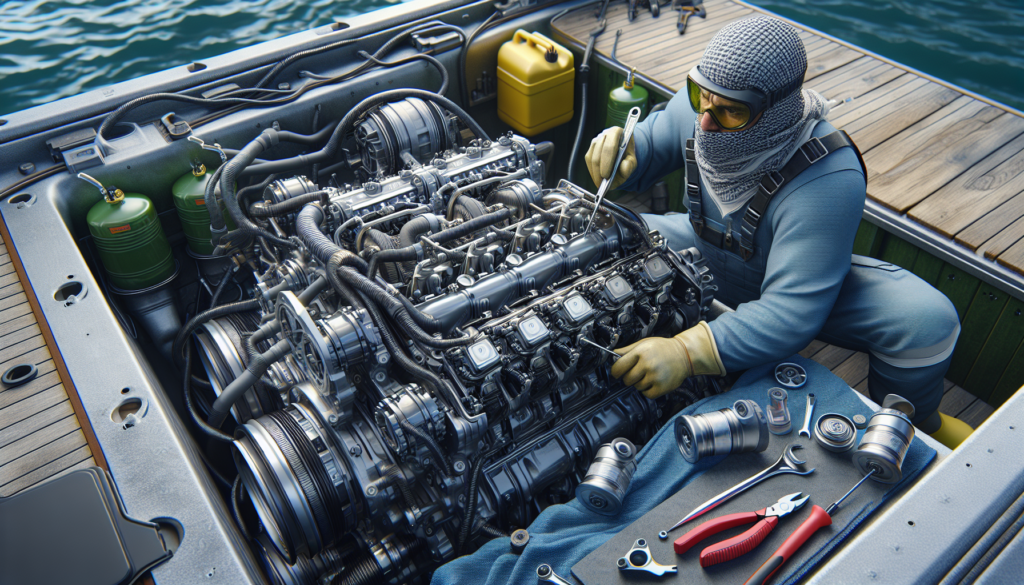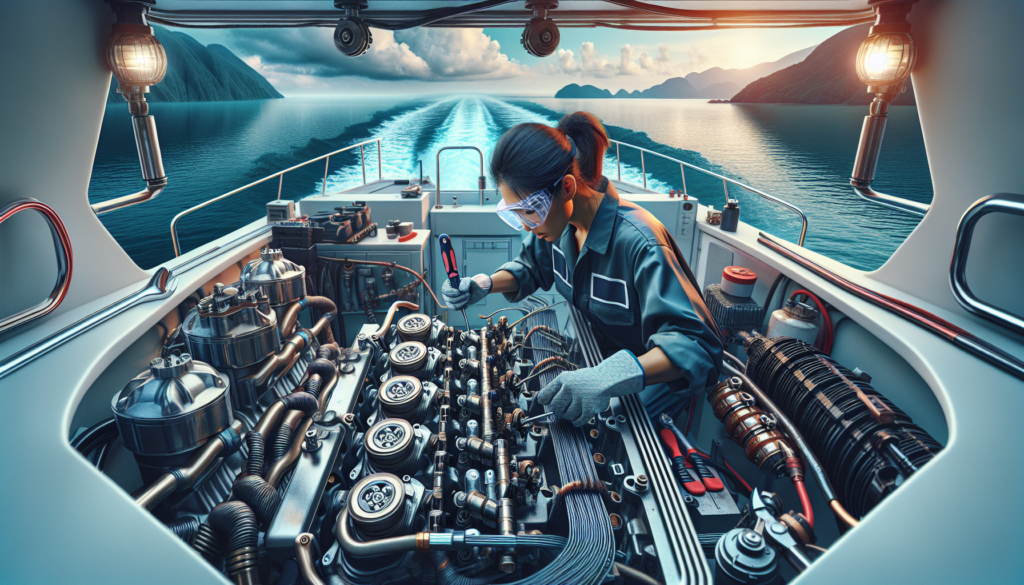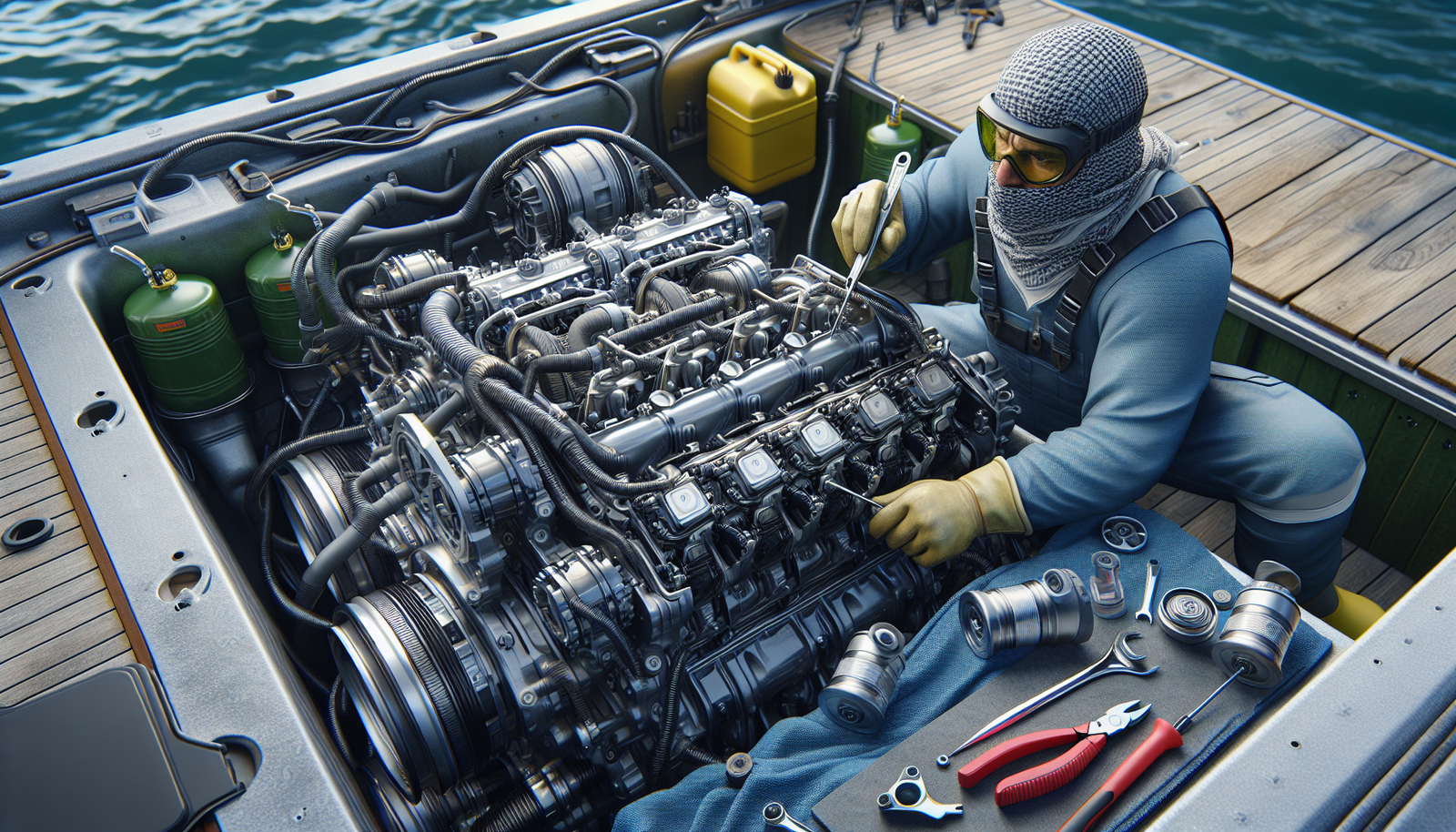Navigating the open waters can be an exhilarating experience, but only if your boat engine is up to the task. The very heart of your vessel, its continuous performance is non-negotiable. “Key Steps for Keeping Your Boat Engine Running Smoothly” sets you on course, providing invaluable advice on how to properly maintain this vital piece of machinery. Understanding the fundamental aspects of care and repair, while supplying you with industry-insider tips, this article ensures that you’ll successfully keep your engine purring, letting you concentrate on enjoying your time at sea.

Understanding the Basics of Boat Engine Maintenance
Hey there! Let’s talk about something essential for any boat owner – engine maintenance. Understanding the why’s and how’s of boat engine maintenance is invaluable to both new and seasoned boating enthusiasts.
Learn about different types of boat engines
First things first, it’s crucial that you become familiar with the type of marine engine you’ve got. There are mainly two types of boat engines: outboard and inboard engines. Outboard engines are located outside the boat’s hull, whereas inboard motors are built within. Each type of engine has its own set of unique maintenance needs.
Know the importance of regular engine maintenance
You might ask why regular engine check-ups matter. Well, neglecting these can lead to performance issues, engine failure and will even shorten your boat’s lifespan. Plus, regular maintenance helps you stay ahead of potential issues that could leave you stranded in the middle of the water.
Familiarize yourself with common engine problems
Some engine challenges are pretty common, regardless of the engine type or the boat’s age. Issues like overheating, stalling, problems with starting the engine, or excessive smoke are common examples. Knowing these common troubles can help you perform effective troubleshooting when needed.
Routine Inspection of the Engine
Like your car, your boat engine needs a routine inspection to keep it running smoothly.
Checking for visible signs of wear and tear
Make sure to visually inspect your boat engine periodically. While you’re at it, look for signs of corrosion, loose or worn parts, and other indications of wear and tear. Early detection can prevent these issues from worsening.
Inspecting engine belts and hoses
Belts and hoses are easy to overlook but are crucial parts of your engine. Be sure to check for any cracks, brittleness, or signs of age on belts and hoses. Replace them as necessary to prevent engine failure.
Looking for leaks and other abnormalities
Leaks are never a good sign. Regular checks can help you catch any pits, cracks, rust, and leaks early enough to prevent major engine damage.
Regular Oil Changes
The lifeblood of your boat engine is its oil. Regular oil changes are a critical aspect of engine maintenance.
Understanding the importance of regular oil changes
Without regular oil changes, your engine loses its lubrication, which can cause excessive wear or damage to the engine components. Be sure to change your engine oil at least once a year or every 100 hours of operation.
Knowing the correct type of oil for your engine
The type of oil used can massively impact the engine’s efficiency. Check your owner’s manual for the manufacturer’s recommendation on the right kind of oil.
Learning how to change the oil in your boat engine
Changing your boat’s oil might seem intimidating, but it doesn’t have to be. You can do it yourself using an oil extractor pump and some basic tools. However, if you aren’t sure, it’s always best to hire a professional.

Proper Fuel Management
Correct fuel handling can significantly extend the life of your boat engine.
Choice of the right type of fuel
The type of fuel you use can greatly affect the performance and lifespan of your engine. Be sure to use the correct fuel type as recommended by the manufacturer.
Prevent fuel contamination
Water and dirt can contaminate your boat engine’s fuel, leading into a series of troubles, from engine problems to complete failure. Avoid this by ensuring your fuel system is clean and well-sealed.
Importance of fuel additives
Using fuel additives can help clean your engine and enhance its performance. They remove build-ups, reduce emissions, and improve overall engine health.
Maintaining the Cooling System
Keeping your boat engine’s cooling system in good condition is of utmost importance.
Importance of a well-functioning cooling system
An overheating boat engine can quickly become a huge problem. The cooling system plays a crucial role in regulating your engine’s temperature. If neglected, it may lead to potentially damaging heat build-up.
Checking for blockages in the cooling system
Blockages in the cooling system can lead to insufficient cooling. Regularly check and clean the raw-water strainer to keep your cooling system operating efficiently.
Regular flushing of the cooling system
Flushing the cooling system regularly can keep it free from salt, dirt, and other debris that could cause blockages or corrosion. Make sure to do this, especially after a run in saltwater.
Battery Care and Maintenance
Taking care of the boat’s battery can save you from unexpected engine start issues.
Regularly inspecting the battery
Check your battery regularly for appropriate electrolyte levels, clean terminals, and ensure the connections are tight and corrosion-free.
Understanding when to charge the battery
A well-charged battery gives an engine the initial power it needs to start up. Using a voltmeter, check your boat battery’s charge. Anything below 12.6 volts needs charging.
Knowing when to replace the battery
Most boat batteries will last between 3 and 6 years if properly maintained. However, if your battery frequently loses charge, it may be time to replace it entirely.
Care of the Propeller
The propeller, like other parts of the boat, needs routine inspection and care.
Inspecting the propeller as part of routine maintenance
Regularly check your propeller for dents, nicks, or severe wear. Damages on the propeller can affect the boat’s performance by causing vibration and reducing the boat’s speed and fuel efficiency.
Understanding the signs of propeller issues
If your boat handles poorly, vibrates excessively, or consumes too much fuel, it may be time to check your propeller. These could be indications of propeller issues.
Performing necessary propeller repairs or replacements
If your propeller is damaged, take it to a professional for repair or replace it as needed. A well-maintained propeller can make a significant difference in your boat’s performance.
Bilge Pump Considerations
The bilge pump is an essential part of your boat’s safety system.
Knowing the role of the bilge pump
The bilge pump removes excess water from the hull of your boat. If not maintained well, a failed pump can turn a minor leak into a serious problem.
Maintaining and checking bilge pump operation
Make sure your bilge pump is working correctly. Test it regularly and clean the strainer to prevent blockage.
Covering the problems associated with bilge pump failures
Bilge pump failure can result in water flooding the boat, causing it to become unstable or even sink. Regular inspection and maintenance can prevent sudden and costly pump failures.
Winterizing Your Boat Engine
If you are in an area that experiences bitter winter, your boat engine needs to be winterized.
Understanding the need for winterization
Winterization prepares your boat for long cold storage periods, protecting it from freezing winter temperatures that can cause extensive damage.
Steps involved in properly winterizing a boat engine
Winterization often includes draining and stabilizing the fuel system, changing the oil, adding antifreeze to the cooling system, and thoroughly cleaning and drying the interior and exterior of the boat.
Potential problems if winterization is skipped
Failing to properly winterize your boat can lead to a host of problems like system blockages, engine corrosion, and potential freeze damage that can cost you a fortune to repair.
Finding Professional Help
Sometimes, maintaining your boat might require professional help.
Knowing when to seek professional help
If you have performed necessary troubleshooting and your engine still shows signs of trouble, it may be time to bring in a professional.
Finding a reputable marine mechanic
A trusted marine mechanic can help ensure excellent boat maintenance. Look for ones with good reviews, a solid reputation, and preferably a certification.
Understanding the cost of professional boat engine maintenance
Professional boat engine maintenance can be pricey but think of it as an investment. Regular professional check-ups can help prevent severe damage in the future and ensure that your water journeys are safe and smooth.
That concludes our comprehensive guide to boat engine maintenance. Remember, proper care and maintenance of your boat’s engine will save you time, money, and potentially ensure your safety on the water. Happy boating!

